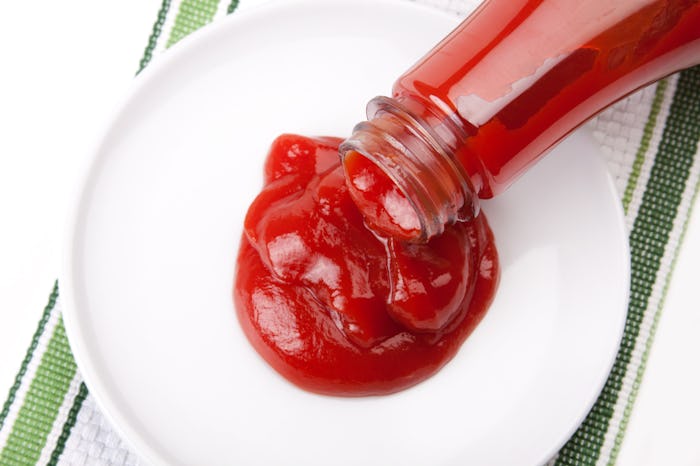Life

Here's When Your Baby Can Enjoy Ketchup
Imagine a world where there was nothing to dip your fries in, where your burger lay dry and bare atop a boring bun. Sounds pretty sad, right? There are some things that are made to make life better, and ketchup is one of them. From kids to adults, everyone loves the condiment — my kids even put it in their mac and cheese (weird, I know) and on their eggs. With all the dietary guidelines you hear about, if you have younger ones, you may wonder, when can I give my baby ketchup?
What's ketchup made of anyway? Most popular ketchup brands, explained MadeHow, are made with tomatoes or tomato concentrate, distilled vinegar, high fructose corn syrup, corn syrup, and other natural flavorings. Two versions of corn syrup? Yes — that's a lot of sugar.
You should always read nutrition labels, especially if you are considering something for your baby. How much sugar is in a serving of ketchup? The label on a bottle of Heinz Ketchup shows that 1 tablespoon of ketchup contains about 4 grams of sugar. Believe it or not, that's the same amount of sugar in an entire Chips Ahoy! Chocolate Chip Cookie. But honestly, who really pours out just a tiny spoonful? Most parents don't think of ketchup as a sugar or sweet, so it usually flies under the radar, in never-ending globs smothered over their kid's food.
When it comes to babies, because their developing bodies are so vulnerable, it's important to be careful of how much, and what types of sugars you feed them. According to Parents, high fructose corn syrup (HFCS), the sweetener in ketchup, is widely used because it's a cheaper alternative to cane sugar, not because it's healthier. The article further noted that because HFCS contains fructose, it can make your baby gain weight, unlike natural sugars which contain glucose. When your baby eats something with natural sugars or glucose, like fruits or milk, these sugars signal to baby's brain when they are full, but fructose sugars don't trigger these signals, causing you to overeat, explained Parents. Overeating, especially sugary foods, can lead to obesity, high blood sugar levels, or diabetes.
So when can you give your baby ketchup? You'll want to make sure they're old enough to handle something other than breast milk or formula, and you probably won't want to give them the same portion size you would eat. If you're unsure about letting your baby have a tiny bit of ketchup on the end of a french fry, it might be worth waiting until they're older and a little more interested — they literally don't know what they're missing.
Make sure to ask your pediatrician if you have any questions about your baby's diet or health. Because my family loves ketchup, I buy the organic, naturally sweetened, or low sugar versions that are becoming easily available in grocery stores. If you are considering giving your baby ketchup, look for one with natural sugar alternatives or one that's lower in sugar, maybe even homemade if you're up for it.